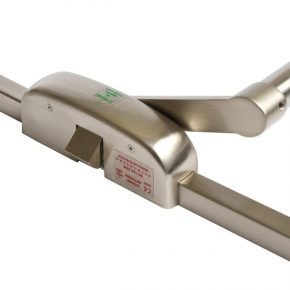
Why energy bills are predicted to increase as summer temperatures rise
GUEST BLOG: Phil Foster, CEO of Love Energy Savings looks at why, despite energy usage declining in summer months, it doesnt mean bills will go down. And why, with energy costs set to soar in the long term, why our focus should remain on energy efficiency to drive down fuel bills.
Energy prices expected to rise by 30% over the next five years
As a nation of weekend sun worshippers, we couldnt be happier to see the rays shining through our windows and warming up our homes. However once the weekend is over and its back to business, our enthusiasm for a warm temperature starts to decline and the reality dawns on us that heating up doesnt mean energy usage (and bills) will go down.
Those who work in heavy industry know better than many just how important it is to keep temperatures down if business is to carry on as usual. Keeping machinery cool can be an expensive business and with energy bills expected to rise over the next five years, it looks like it will also be an expensive.
Summer months may turn the heat up on energy bills
Business owners who have consistently struggled with their energy bills may think that summer will give respite, but unfortunately the warmer months may actually increase the size of energy bills for some companies. While it certainly does cost a large amount to have the heating running all of the time during the winter months, in order to keep workers happy and warm, the addition of air conditioning and cooling systems throughout summer can also add a substantial chunk to your overall energy bills.
Air conditioning can increase a buildings overall energy consumption by 100%, according to the Carbon Trust. It takes up to ten units of electricity to produce just one unit of compressed air, when you consider how many air conditioning vents you have in an average sized office that operates at a typical 40 hour week, you can understand how summer energy bills rise so steeply.
Employee temperature wars can also cause energy bills to rise. Those working in offices may insist on having the heating on while those working with machinery may desperately need to cool down. This constant cooling and warming to meet employee demand can equate to a chaotic general temperature, as well as causing your energy bills to soar. The Department of Energy and Climate Change (DECC) has estimated that electricity prices will rise by almost 30% for SMEs over the next five years, so the time has come to put our bad summer energy habits to bed.
In addition to this, brightly shining sun beaming into the office may seem pleasant at first but after spending an hour squinting in blinding sunlight it could be time to block out the sun and turn the lights on. Research by DECC revealed that lighting can create up to 40% of a business energy consumption, so it is crucial to keep these costs to a minimum.
Dont take a vacation from being energy efficient
The Department of Energy and Climate Change has estimated that businesses could reduce their energy bills by 18-25% by installing energy efficient measures. But energy management is full-time, year-round job, which businesses should never take a break from.
Staff annual leave during the summer months means that everyone in the business should be even more vigilant when it comes to being energy efficient. While there may be less people in the office, it only takes a few pieces of equipment to be left on for a couple of weeks while people are away to significantly affect the cost of your energy bills.
Regulation and Compliance
With increasingly strict EU regulation seeming to require industries to account for every tonne of CO2 they emit, saving energy wherever possible is a very real necessity. The EU has set itself a target of 20% energy savings by 2020 which is planned to increase to a 27% or greater saving by 2030. The EU commission itself has proposed a 30% savings target. The UK is aiming to achieve a zero carbon standard for buildings by 2019, are you convinced by the need to cap your energy usage yet?
In addition to EU pressure, ESOS audits are now required to be undertaken by all large businesses, the first one needs to be completed by December 2015 and then an audit will be required ever four years thereafter, the DECC has claimed that there is still significant potential for energy efficiency measures to be implemented across the UK and they are committed to providing a framework for the UK to reach its full green potential.
For smaller businesses the DECC has released a guide for SMEs to enhance their energy efficiency. The report claims that energy prices are expected to rise by 30% over the next five years with a third of firms in the UK claiming it is the cost of energy which is a key barrier for growth. Despite this, many businesses are still falling into the trap of paying overly expensive energy tariffs. New regulations mean that it now only takes six weeks to switch suppliers and energy price comparison sites, such as Love Energy Savings, can make the switching process even simpler. A business would only need to take 10 minutes out of their day to enter their postcode and estimated energy consumption for the best deal to be highlighted to them.
Businesses should take action now
Phil Foster, CEO of Love Energy Savings urges businesses to take action now By implementing energy saving actions as soon as possible businesses could start saving money and avoid falling short of regulatory requirements. It is important that energy management is not pushed down to the bottom of the to-do list but starts to become a more important part of cash-flow and business management.
http://www.carbontrust.com/resources/guides/energy-efficiency/heating,-ventilation-and-air-conditioning-hvac
https://www.gov.uk/government/publications/sme-guide-to-energy-efficiency
https://www.gov.uk/government/publications/approaches-to-esos-audits
Phil Foster, CEO of Love Energy Savings.
About Phil Foster
Phil Foster is the CEO of Love Energy Savings. He has always had a strong desire to support UK businesses, helping them to make much needed savings on their energy bills. With that in mind, he created a business energy comparison service to help business owners not only improve their profits, but also save valuable time in the process of comparing and switching suppliers. Advocating energy efficiency and awareness of energy usage, alongside tariff comparison, he is committed to helping businesses save money so they can continue to grow.
SEND YOUR COMMENTS TO BUILDINGTALK
READ MORE BLOGS
Latest news

19th April 2024
ASSA ABLOY: Access solutions can impact sustainability performance across the full life-cycle of a building
Embedding sustainability within any organisation requires a broad, strategic perspective. Scrutiny should include the physical infrastructure itself: According to the IEA, buildings consume around 30% of global energy*. ASSA ABLOY has more…
Posted in Access Control & Door Entry Systems, Architectural Ironmongery, Articles, Building Industry News, Building Products & Structures, Building Regulations & Accreditations, Building Services, Case Studies, Doors, Facility Management & Building Services, Information Technology, Research & Materials Testing, Retrofit & Renovation, Security and Fire Protection, Sustainability & Energy Efficiency, Video of the Week
19th April 2024
British weather doesn't dampen spirit for new HMG Garden Paint
Despite one of the wettest starts to the year on record, customers are starting to plan for brighter days with HydroPro Garden Paint from HMG Paints.
Posted in Articles, Building Industry News, Building Products & Structures, Garden, Innovations & New Products, Paints, Paints, Coatings & Finishes, Restoration & Refurbishment, Retrofit & Renovation, Site Preparation, Sustainability & Energy Efficiency, Waste Management & Recycling
18th April 2024
Abloy UK showcases new digital portfolio at The Security Event 2024
Abloy UK is set to unveil its latest line-up of access control systems at The Security Event 2024, welcoming guests to explore its cutting-edge electromechanical and digital solutions on stand 5/F50.
Posted in Access Control & Door Entry Systems, Architectural Ironmongery, Articles, Building Industry Events, Building Industry News, Building Products & Structures, Building Services, Doors, Exhibitions and Conferences, Facility Management & Building Services, Health & Safety, Information Technology, Retrofit & Renovation, Security and Fire Protection
18th April 2024
Strand is a Failsafe Choice for Emergency Exit and Panic Hardware
In times of emergency, you’re in safe hands with Strand Hardware. Although there are many considerations for building specification, few decisions can be as critical as selecting the right emergency exit/panic hardware.
Posted in Access Control & Door Entry Systems, Architectural Ironmongery, Articles, Building Industry News, Building Products & Structures, Building Services, Doors, Facility Management & Building Services, Health & Safety, Restoration & Refurbishment, Retrofit & Renovation, Security and Fire Protection
 Sign up:
Sign up: